- Home
- Roald Dahl
The Best of Roald Dahl Page 12
The Best of Roald Dahl Read online
Page 12
This time the cat was ready for it, and all that happened to begin with was a small extra tensing of the body. But as the music swelled and quickened into that first exciting rhythm of the introduction to the fugue, a strange look that amounted almost to ecstasy began to settle upon the creature's face. The ears, which up to then had been pricked up straight, were gradually drawn back, the eyelids drooped, the head went over to one side, and at that moment Louisa could have sworn that the animal was actually appreciating the work.
What she saw (or thought she saw) was something she had noticed many times on the faces of people listening very closely to a piece of music. When the sound takes complete hold of them and drowns them in itself, a peculiar, intensely ecstatic look comes over them that you can recognize as easily as a smile. So far as Louisa could see, the cat was now wearing almost exactly this kind of look.
Louisa finished the fugue, then played the siciliana, and all the way through she kept watching the cat on the sofa. The final proof for her that the animal was listening came at the end, when the music stopped. It blinked, stirred itself a little, stretched a leg, settled into a more comfortable position, took a quick glance round the room, then looked expectantly in her direction. It was precisely the way a concert-goer reacts when the music momentarily releases him in the pause between two movements of a symphony. The behaviour was so thoroughly human it gave her a queer agitated feeling in the chest.
'You like that?' she asked. 'You like Vivaldi?'
The moment she'd spoken, she felt ridiculous, but not - and this to her was a trifle sinister - not quite so ridiculous as she knew she should have felt.
Well, there was nothing for it now except to go straight ahead with the next number on the programme, which was Carnaval. As soon as she began to play, the cat again stiffened and sat up straighter; then, as it became slowly and blissfully saturated with the sound, it relapsed into that queer melting mood of ecstasy that seemed to have something to do with drowning and with dreaming. It was really an extravagant sight - quite a comical one, too - to see this silvery cat sitting on the sofa and being carried away like this. And what made it more screwy than ever, Louisa thought, was the fact that this music, which the animal seemed to be enjoying so much, was manifestly too difficult, too classical, to be appreciated by the majority of humans in the world.
Maybe, she thought, the creature's not really enjoying it at all. Maybe it's a sort of hypnotic reaction, like with snakes. After all, if you can charm a snake with music, then why not a cat? Except that millions of cats hear the stuff every day of their lives, on radio and gramophone and piano, and, as far as she knew, there'd never yet been a case of one behaving like this. This one was acting as though it were following every single note. It was certainly a fantastic thing.
But was it not also a wonderful thing? Indeed it was. In fact, unless she was much mistaken, it was a kind of miracle, one of those animal miracles that happen about once every hundred years.
'I could see you loved that one,' she said when the piece was over. 'Although I'm sorry I didn't play it any too well today. Which did you like best - the Vivaldi or the Schumann?'
The cat made no reply, so Louisa, fearing she might lose the attention of her listener, went straight into the next part of the programme - Liszt's second Petrarch Sonnet.
And now an extraordinary thing happened. She hadn't played more than three or four bars when the animal's whiskers began perceptibly to twitch. Slowly it drew itself up to an extra height, laid its head on one side, then on the other, and stared into space with a kind of frowning concentrated look that seemed to say, 'What's this? Don't tell me. I know it so well, but just for the moment I don't seem to be able to place it.' Louisa was fascinated, and with her little mouth half open and half smiling, she continued to play, waiting to see what on earth was going to happen next.
The cat stood up, walked to one end of the sofa, sat down again, listened some more; then all at once it bounded to the floor and leaped up on to the piano bench beside her. There it sat, listening intently to the lovely sonnet, not dreamily this time, but very erect, the large yellow eyes fixed upon Louisa's fingers.
'Well!' she said as she struck the last chord. 'So you came up to sit beside me, did you? You like this better than the sofa? All right, I'll let you stay, but you must keep still and not jump about.' She put out a hand and stroked the cat softly along the back, from head to tail. 'That was Liszt,' she went on. 'Mind you, he can sometimes be quite horribly vulgar, but in things like this he's really charming.'
She was beginning to enjoy this odd animal pantomime, so she went straight on into the next item on the programme, Schumann's Kinderscenen.
She hadn't been playing for more than a minute or two when she realized that the cat had again moved, and was now back in its old place on the sofa. She'd been watching her hands at the time, and presumably that was why she hadn't even noticed its going; all the same, it must have been an extremely swift and silent move. The cat was still staring at her, still apparently attending closely to the music, and yet it seemed to Louisa that there was not now the same rapturous enthusiasm there'd been during the previous piece, the Liszt. In addition, the act of leaving the stool and returning to the sofa appeared in itself to be a mild but positive gesture of disappointment.
'What's the matter?' she asked when it was over. 'What's wrong with Schumann? What's so marvellous about Liszt?' The cat looked straight back at her with those yellow eyes that had small jet-black bars lying vertically in their centres.
This, she told herself, is really beginning to get interesting - a trifle spooky, too, when she came to think of it. But one look at the cat sitting there on the sofa, so bright and attentive, so obviously waiting for more music, quickly reassured her.
'All right,' she said. 'I'll tell you what I'm going to do. I'm going to alter my programme specially for you. You seem to like Liszt so much, I'll give you another.'
She hesitated, searching her memory for a good Iiszt; then softly she began to play one of the twelve little pieces from Der Weihnachtsbaum. She was now watching the cat very closely, and the first thing she noticed was that the whiskers again began to twitch. It jumped down to the carpet, stood still a moment, inclining its head, quivering with excitement, and then, with a slow, silky stride, it walked round the piano, hopped up on the bench, and sat down beside her.
They were in the middle of all this when Edward came in from the garden.
'Edward!' Louisa cried, jumping up. 'Oh, Edward, darling! Listen to this! Listen what's happened!'
'What is it now?' he said. 'I'd like some tea.' He had one of those narrow, sharp-nosed, faintly magenta faces, and the sweat was making it shine as though it were a long wet grape.
'It's the cat!' Louisa cried, pointing to it sitting quietly on the piano bench. 'Just wait till you hear what's happened!'
'I thought I told you to take it to the police.'
'But, Edward, listen to me. This is terribly exciting. This is a musical cat.'
'Oh, yes?'
'This cat can appreciate music, and it can understand it too.'
'Now stop this nonsense, Louisa, and let's for God's sake have some tea. I'm hot and tired from cutting brambles and building bonfires.' He sat down in an armchair, took a cigarette from a box beside him, and lit it with an immense patent lighter that stood near the box.
'What you don't understand,' Louisa said, 'is that something extremely exciting has been happening here in our own house while you were out, something that may even be ... well ... almost momentous.'
'I'm quite sure of that.'
'Edward, please!'
Louisa was standing by the piano, her little pink face pinker than ever, a scarlet rose high up on each cheek. 'If you want to know,' she said, 'I'll tell you what I think.'
'I'm listening, dear.'
'I think it might be possible that we are at this moment sitting in the presence of -' She stopped, as though suddenly sensing the absurdity of the thought
.
'Yes?'
'You may think it silly, Edward, but it's honestly what I think.'
'In the presence of who, for heaven's sake?'
'Of Franz Liszt himself!'
Her husband took a long slow pull at his cigarette and blew the smoke up at the ceiling. He had the tight-skinned, concave cheeks of a man who has worn a full set of dentures for many years, and every time he sucked at a cigarette, the cheeks went in even more, and the bones of his face stood out like a skeleton's. 'I don't get you.' he said.
'Edward, listen to me. From what I've seen this afternoon with my own eyes, it really looks as though this might actually be some sort of a reincarnation.'
'You mean this lousy cat?'
'Don't talk like that, dear, please.'
'You're not ill, are you, Louisa?'
'I'm perfectly all right, thank you very much. I'm a bit confused - I don't mind admitting it, but who wouldn't be after what's just happened? Edward, I swear to you -'
'What did happen, if I may ask?'
Louisa told him, and all the while she was speaking, her husband lay sprawled in the chair with his legs stretched out in front of him, sucking at his cigarette and blowing the smoke up at the ceiling. There was a thin cynical smile on his mouth.
'I don't see anything very unusual about that,' he said when it was over. 'All it is - it's a trick cat. It's been taught tricks, that's all.'
'Don't be silly, Edward. Every time I play Liszt, he gets all excited and comes running over to sit on the stool beside me. But only for Liszt, and nobody can teach a cat the difference between Liszt and Schumann. You don't even know it yourself. But this one can do it every single time. Quite obscure Liszt, too.'
'Twice,' the husband said. 'He's only done it twice.'
'Twice is enough.'
'Let's see him do it again. Come on.'
'No,' Louisa said. 'Definitely not. Because if this is Liszt, as I believe it is, or anyway the soul of Liszt or whatever it is that comes back, then it's certainly not right or even very kind to put him through a lot of silly undignified tests.'
'My dear woman! This is a cat - a rather stupid grey cat that nearly got its coat singed by the bonfire, this morning in the garden. And anyway, what do you know about reincarnation?'
'If his soul is there, that's enough for me,' Louisa said firmly. 'That's all that counts.'
'Come on, then. Let's see him perform. Let's see him tell the difference between his own stuff and someone else's.'
'No, Edward. I've told you before. I refuse to put him through any more silly circus tests. He's had quite enough of that for one day. But I'll tell you what I will do. I'll play him a little more of his own music.'
'A fat lot that'll prove.'
'You watch. And one thing is certain - as soon as he recognizes it, he'll refuse to budge off that bench where he's sitting now.'
Louisa went to the music shelf, took down a book of Liszt, thumbed through it quickly, and chose another of his finger compositions - the B minor Sonata. She had meant to play only the first part of the work, but once she got started and saw how the cat was sitting there literally quivering with pleasure and watching her hands with that rapturous concentrated look, she didn't have the heart to stop. She played it all the way through. When it was finished, she glanced up at her husband and smiled. 'There you are,' she said. 'You can't tell me he wasn't absolutely loving it.'
'He just likes the noise, that's all.'
'He was loving it. Weren't you, darling?' she said, lifting the cat in her arms. 'Oh, my goodness, if only he could talk. Just think of it, dear - he met Beethoven in his youth! He knew Schubert and Mendelssohn and Schumann and Berlioz and Grieg and Delacroix and Ingres and Heine and Balzac. And let me see ... My heavens, he was Wagner's father-in-law! I'm holding Wagner's father-in-law in my arms!'
'Louisa!' her husband said sharply, sitting up straight. 'Pull yourself together.' There was a new edge to his voice now, and he spoke louder.
Louisa glanced up quickly. 'Edward, I do believe you're jealous!'
'Oh, sure, sure I'm jealous - of a lousy grey cat!'
'Then don't be so grumpy and cynical about it all. If you're going to behave like this, the best thing you can do is to go back to your gardening and leave the two of us together in peace. That will be best for all of us, won't it, darling?' she said, addressing the cat, stroking its head. 'And later on this evening, we shall have some more music together, you and I, some more of your own work. Oh, yes,' she said, kissing the creature several times on the neck, 'and we might have a little Chopin, too. You needn't tell me - I happen to know you adore Chopin. You used to be great friends with him, didn't you, darling? As a matter of fact - if I remember rightly - it was in Chopin's apartment that you met the great love of your life, Madame Something-or-Other. Had three illegitimate children by her, too, didn't you? Yes, you did, you naughty thing, and don't go trying to deny it. So you shall have some Chopin,' she said, kissing the cat again, 'and that'll probably bring back all sorts of lovely memories to you, won't it?'
'Louisa, stop this at once!'
'Oh, don't be so stuffy, Edward.'
'You're behaving like a perfect idiot, woman. And anyway, you forget we're going out this evening, to Bill and Betty's for canasta.'
'Oh, but I couldn't possibly go out now. There's no question of that'.
Edward got up slowly from his chair, then bent down and stubbed his cigarette hard into the ashtray. 'Tell me something,' he said quietly. 'You don't really believe this - this twaddle you're talking, do you?'
'But of course I do. I don't think there's any question about it now. And, what's more, I consider that it puts a tremendous responsibility upon us, Edward - upon both of us. You as well.'
'You know what I think,' he said. 'I think you ought to see a doctor. And damn quick too.'
With that, he turned and stalked out of the room, through the French windows, back into the garden.
Louisa watched him striding across the lawn towards his bonfire and his brambles, and she waited until he was out of sight before she turned and ran to the front door, still carrying the cat.
Soon she was in the car, driving to town.
She parked in front of the library, locked the cat in the car, hurried up the steps into the building, and headed straight for the reference room. There she began searching the cards for books on two subjects - REINCARNATION and LISZT.
Under REINCARNATION she found something called Recurring Earth-Lives - How and Why, by a man called F. Milton Willis, published in 1921. Under LISZT she found two biographical volumes. She took out all three books, returned to the car, and drove home.
Back in the house, she placed the cat on the sofa, sat herself down beside it with her three books, and prepared to do some serious reading. She would begin, she decided, with Mr F. Milton Willis's work. The volume was thin and a trifle soiled, but it had a good heavy feel to it, and the author's name had an authoritative ring.
The doctrine of reincarnation, she read, states that spiritual souls pass from higher to higher forms of animals. 'A man can, for instance, no more be reborn as an animal than an adult can re-become a child.'
She read this again. But how did he know? How could he be so sure? He couldn't. No one could possibly be certain about a thing like that. At the same time, the statement took a great deal of the wind out of her sails.
'Around the centre of consciousness of each of us, there are, besides the dense outer body, four other bodies, invisible to the eye of flesh, but perfectly visible to people whose faculties of perception of superphysical things have undergone the requisite development ...'
She didn't understand that one at all, but she read on, and soon she came to an interesting passage that told how long a soul usually stayed away from the earth before returning in someone else's body. The time varied according to type, and Mr Willis gave the following breakdown:
Drunkards and the unemployable 40/50 YEARS
Unskilled labourer
s 60/100 "
Skilled workers 100/200 "
The bourgeoisie 200/300 "
The upper-middle classes 500 "
The highest class of gentleman farmers 600/1,000 "
Those in the Path of Initiation 1,500/2,000 "
Quickly she referred to one of the other books, to find out how long Liszt had been dead. It said he died in Bayreuth in 1886. That was sixty-seven years ago. Therefore, according to Mr Willis, he'd have to have been an unskilled labourer to come back so soon. That didn't seem to fit at all. On the other hand, she didn't think much of the author's methods of grading. According to him, 'the highest class of gentleman farmer' was just about the most superior being on the earth. Red jackets and stirrup cups and the bloody, sadistic murder of the fox. No, she thought, that isn't right. It was a pleasure to find herself beginning to doubt Mr Willis.
Later in the book, she came upon a list of some of the more famous reincarnations. Epictetus, she was told, returned to earth as Ralph Waldo Emerson. Cicero came back as Gladstone, Alfred the Great as Queen Victoria, William the Conqueror as Lord Kitchener. Ashoka Vardhana, King of India in 272 B.C., came back as Colonel Henry Steel Olcott, an esteemed American lawyer. Pythagoras returned as Master Koot Hoomi, the gentleman who founded the Theosophical Society with Mme Blavatsky and Colonel H. S. Olcott (the esteemed American lawyer, alias Ashoka Vardhana, King of India). It didn't say who Mme Blavatsky had been. But 'Theodore Roosevelt,' it said,
has for numbers of incarnations played great parts as a leader of men ... From him descended the royal line of ancient Chaldea, he having been, about 30,000 B.C., appointed Governor of Chaldea by the Ego we know as Caesar who was then ruler of Persia ... Roosevelt and Caesar have been together time after time as military and administrative leaders; at one time, many thousands of years ago, they were husband and wife ...
That was enough for Louisa. Mr F. Milton Willis was clearly nothing but a guesser. She was not impressed by his dogmatic assertions. The fellow was probably on the right track, but his pronouncements were extravagant, especially the first one of all, about animals. Soon she hoped to be able to confound the whole Theosophical Society with her proof that man could indeed reappear as a lower animal. Also that he did not have to be an unskilled labourer to come back within a hundred years.

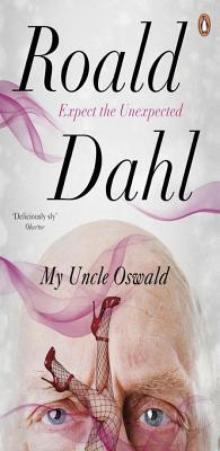 My Uncle Oswald
My Uncle Oswald The Best of Roald Dahl
The Best of Roald Dahl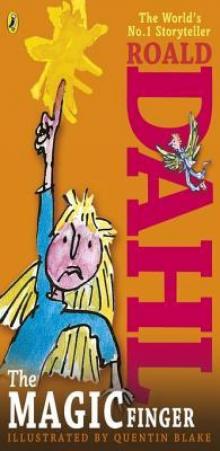 The Magic Finger
The Magic Finger Charlie and the Chocolate Factory
Charlie and the Chocolate Factory Fantastic Mr Fox
Fantastic Mr Fox Matilda
Matilda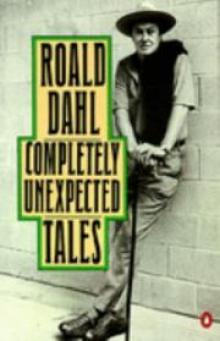 Completely Unexpected Tales: Tales of the Unexpected. More Tales of the Unexpected
Completely Unexpected Tales: Tales of the Unexpected. More Tales of the Unexpected The Wonderful Story of Henry Sugar and Six More
The Wonderful Story of Henry Sugar and Six More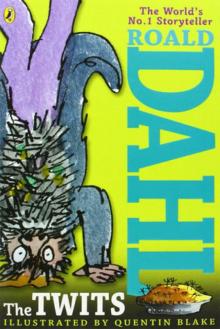 The Twits
The Twits The BFG
The BFG Danny the Champion of the World
Danny the Champion of the World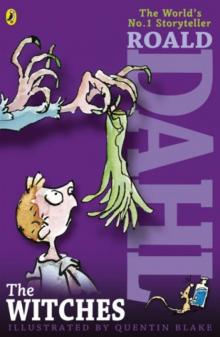 The Witches
The Witches James and the Giant Peach
James and the Giant Peach Charlie and the Great Glass Elevator
Charlie and the Great Glass Elevator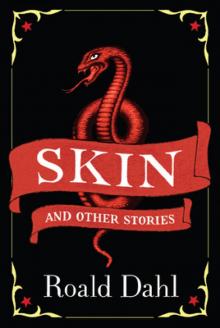 Skin and Other Stories
Skin and Other Stories Kiss Kiss
Kiss Kiss Switch Bitch
Switch Bitch The Giraffe and the Pelly and Me
The Giraffe and the Pelly and Me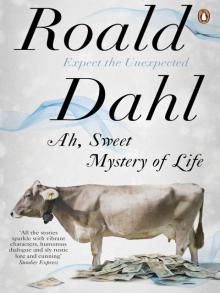 Ah, Sweet Mystery of Life
Ah, Sweet Mystery of Life Fear
Fear The Great Automatic Grammatizator and Other Stories
The Great Automatic Grammatizator and Other Stories Someone Like You
Someone Like You Charlie and the Great Glass Elevator c-2
Charlie and the Great Glass Elevator c-2 More About Boy
More About Boy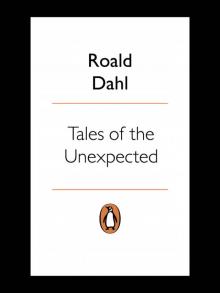 Tales of the Unexpected
Tales of the Unexpected The Umbrella Man and Other Stories
The Umbrella Man and Other Stories Dirty Beasts
Dirty Beasts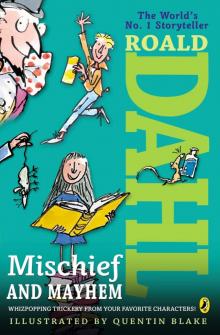 Roald Dahl's Mischief and Mayhem
Roald Dahl's Mischief and Mayhem The Collected Short Stories of Roald Dahl, Volume 1
The Collected Short Stories of Roald Dahl, Volume 1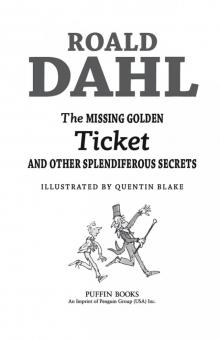 The Missing Golden Ticket and Other Splendiferous Secrets
The Missing Golden Ticket and Other Splendiferous Secrets Billy and the Minpins
Billy and the Minpins Over to You
Over to You Going Solo
Going Solo Deception
Deception War
War Man from the South ee-3
Man from the South ee-3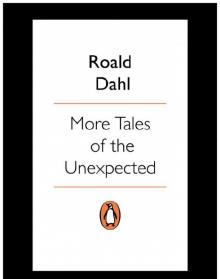 More Tales of the Unexpected
More Tales of the Unexpected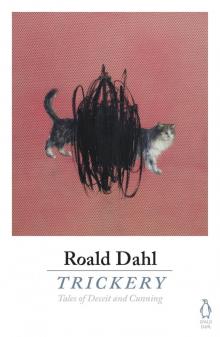 Trickery
Trickery Rhyme Stew
Rhyme Stew Charlie and the Chocolate Factory (Puffin Modern Classics relaunch)
Charlie and the Chocolate Factory (Puffin Modern Classics relaunch)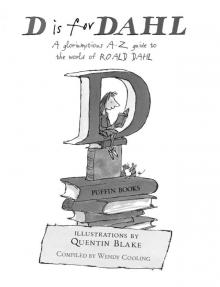 D is for Dahl
D is for Dahl Roald Dahl Whoppsy-Whiffling Joke Book
Roald Dahl Whoppsy-Whiffling Joke Book Spotty Powder and other Splendiferous Secrets
Spotty Powder and other Splendiferous Secrets Charlie and the Chocolate Factory c-1
Charlie and the Chocolate Factory c-1 Boy
Boy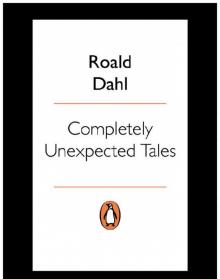 Completely Unexpected Tales
Completely Unexpected Tales Madness
Madness Innocence
Innocence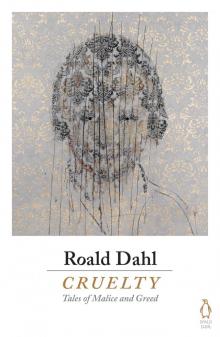 Cruelty
Cruelty George's Marvellous Medicine
George's Marvellous Medicine